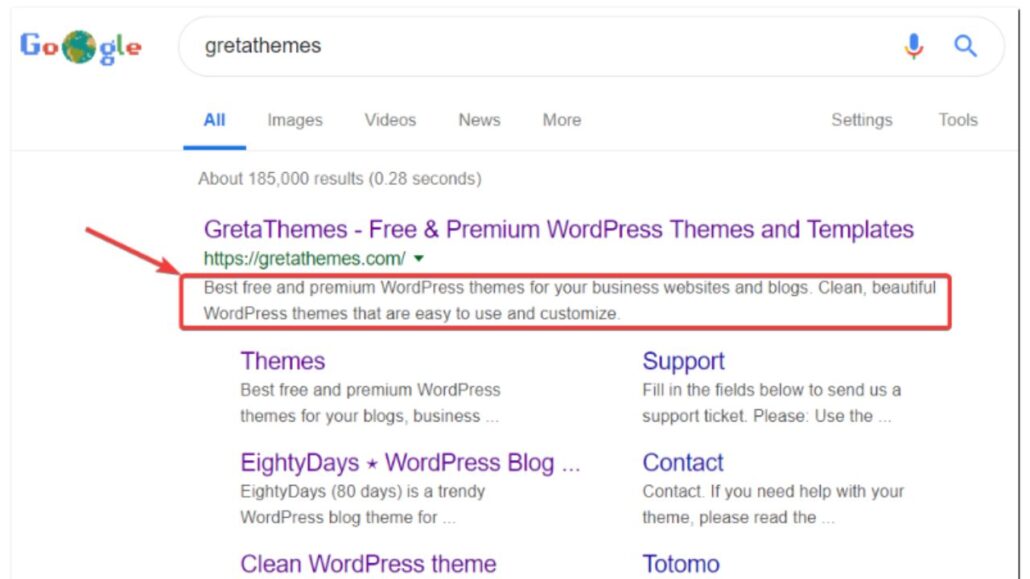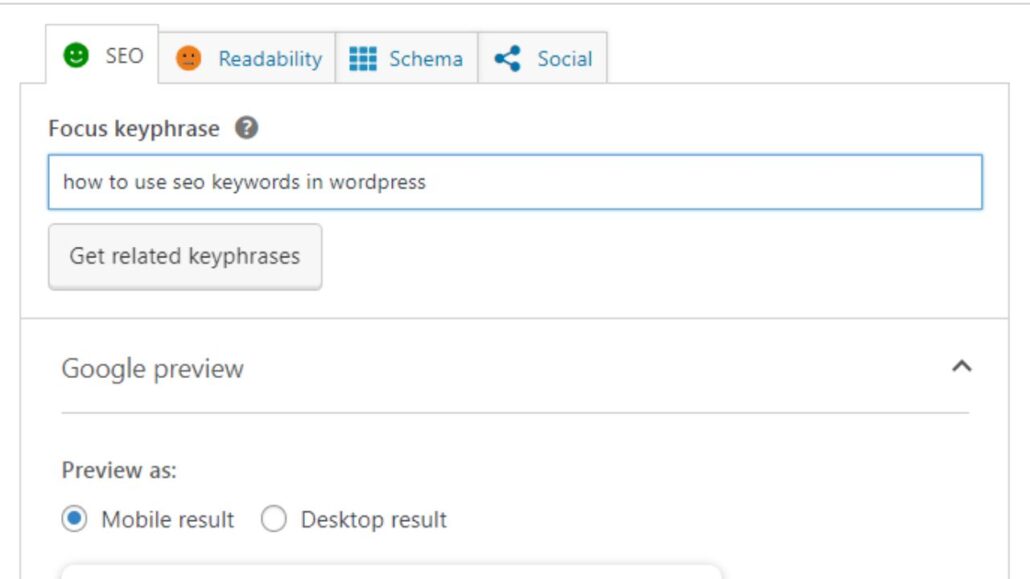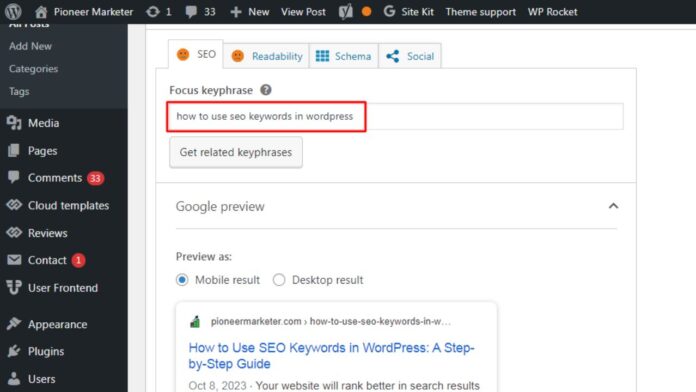Popular content management systems (CMS) like WordPress are used to build and maintain websites. Due to its many features that make it simple to optimize your website for search engines, it is also a superb platform for SEO.
One of the most important things you can do to improve your WordPress SEO is to use relevant keywords throughout your content. Keywords are the words or phrases people will likely use when searching for information online.
Your website will rank better in search results if you use your goal keywords in your content to assist search engines in comprehending what your website is about.
How to Add Keywords in WordPress Without Plugins:
Adding keywords to your WordPress website without plugins involves editing your content directly. You can incorporate relevant keywords naturally within your page or post’s content, headings, and image alt text. Additionally, you can optimize your permalink structure to include keywords for better SEO.
How to Add Meta Keywords in WordPress Without a Plugin:

WordPress no longer supports the meta keywords tag for SEO. Instead, focus on creating high-quality content with naturally integrated keywords and optimizing your meta title and description.
How to Add Keywords in Yoast SEO:

To add keywords to the Yoast SEO plugin, install and activate the plugin, then edit your post or page. In the Yoast SEO meta box, you can enter your focus keyword and receive real-time analysis and suggestions for improving your content’s SEO.
WordPress Keyword Search:
WordPress provides built-in keyword search functionality. You can integrate a search bar into your website using widgets for shortcodes, allowing users to search for specific keywords within your content.
How to Add Multiple Keywords in WordPress:
To target multiple keywords:
Create comprehensive and informative content.
Include variations of your target keywords, but ensure they fit naturally into the context.
Avoid keyword stuffing, as it can harm your SEO efforts.
WordPress Keywords List:
Maintain a list of relevant keywords related to your website’s niche or topics. This list can be a reference when creating content, helping you choose the most appropriate keywords for each post or page.
Meta Description in WordPress Without a Plugin:
You can manually add a meta description to your WordPress posts or pages without a plugin. Edit the post/page and locate the “Excerpt” field in the Document settings. Write a concise and engaging description that summarizes the content’s purpose.
How to Add Meta Title and Description in WordPress Without a Plugin:
To add a custom meta title and description in WordPress without a plugin, edit your post or page and scroll down to the Document settings. In the “SEO” section, you can enter your desired title and description to optimize how your content appears in search engine results.
SEO Keywords
Before diving into how to use SEO keywords in WordPress, it’s essential to understand what SEO keywords are. Users type SEO keywords into search engines when looking for information, products, or services. By identifying the phrases your target audience uses, effective keyword research enables you to optimize your content to meet their search intent.
Keyword Research
The first step in using SEO keywords in WordPress is conducting thorough keyword research. Several tools, like Google Keyword Planner, Ahrefs, SEMrush, and Moz, can assist you in finding keywords that are appropriate for your area.
Identify Your Niche:
Understand your website’s niche and target audience. Knowing your audience’s interests and pain points will help you select keywords that resonate with them.
Brainstorm Seed Keywords:
Start with a few seed keywords related to your niche. These are broad terms that will form the basis for more specific keyword ideas.
Use Keyword Research Tools:
To create a list of prospective keywords, use keyword research tools. Look for keywords that receive a lot of traffic and have little to moderate competition.
Analyze Competitors:
Study your competitors and see which keywords they are ranking for. This can provide valuable insights into keyword opportunities.
Long-Tail Keywords: Consider using long-tail keywords – longer, more specific phrases that often have less competition. They can be highly effective in attracting a more targeted audience.
On-Page Optimization
Once you have a list of target keywords, it’s time to integrate them into your WordPress website effectively.
Content Optimization:
Incorporate your chosen keywords into your website’s content, including blog posts, product descriptions, and page copy. Aim for a keyword density between 1 and 2 per cent to avoid keyword stuffing.
Title Tags:
Place your primary keyword in the title tag of your pages and blog posts. Ensure that the title remains catchy and informative.
Meta Descriptions:
Create captivating meta descriptions with your keywords in them. The snippets called “meta descriptions” in search results might affect click-through rates.
URL Structure:
Customize your URL structure to include keywords when creating new pages or blog posts. Keep URLs short and descriptive.
Use SEO Plugins
WordPress offers a range of SEO plugins that can simplify the process of keyword optimization. Yoast SEO and the All in One SEO Pack are the plugins most used. How to utilize them is as follows:
Yoast SEO:
Install and activate the Yoast SEO plugin.
Edit your content and scroll down to the Yoast SEO meta box.
Enter your target keyword and analyze the provided suggestions for improvements.
Adjust your content based on Yoast’s recommendations to improve SEO.
All-in-One SEO Pack:
Install and activate the All-in-One SEO Pack plugin.
Access the plugin settings and enter your SEO title, meta description, and keywords for each page or post.
Monitor and Update
Regular monitoring is crucial since SEO is a continuous activity. Use tools like Google Analytics and Google Search Console to track the performance of your website.
Google Analytics:
Monitor organic traffic, keyword rankings, and user behaviour on your website.
Google Search Console:
Keep an eye on search queries that bring users to your site, indexation issues, and other SEO-related data.
Regular Updates:
Continuously update and refresh your content with relevant keywords. Trends and user intent can change, so staying up-to-date is crucial.
Conclusion
Effective use of SEO keywords in WordPress is fundamental to improving your website’s visibility and attracting organic traffic. By conducting thorough keyword research, optimizing your content, utilizing SEO plugins, and monitoring your performance, you can boost your site’s ranking on search engines and ultimately grow your online presence. Remember that SEO is an evolving field, so stay informed about the latest trends and best practices to maintain your competitive edge.
FAQ:
What is SEO in WordPress?
WordPress SEO (Search Engine Optimization) refers to improving the content and organization of your website to increase its exposure in search engine results.
How can I use SEO keywords in WordPress?
When using SEO keywords in WordPress, include them in your content’s titles, headers, and body copy.
What is the importance of keyword research?
Keyword research helps you identify relevant keywords for your content, enabling you to target the right audience and improve your SEO strategy in WordPress.
Are there any SEO plugins for WordPress?
Yes, popular SEO plugins like Yoast SEO and All in One SEO Pack can assist in optimizing your content and managing keywords.
Should I overuse keywords in my content?
No, keyword stuffing can harm your SEO. Use keywords judiciously and prioritize high-quality, user-friendly content over excessive keyword usage.



